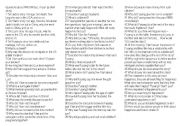
|
PRISON (a short story): Questions
Li Yiyun is an important Chinese-American writer, especially for foreigners teaching English in China. One of many challenges for English teachers in China is locating English-language materials that students can understand culturally--without having to decode unfamiliar cultural references about the West. Li Yiyun thus provides short stories about China that students will understand--there are no unfamiliar cultural references. Students are thus free to concentrate on vocabulary.
The questions in the attachment are about one of Li Yiyunīs short stories. I recommend buying a collection of her stories and then using them in your classes. The questions can be divided up into pairs of, e.g., even and odd questions, and given to pairs of students. Students might be asked first, in pairs, to retell the story, and then, after 10-15 minutes (you can tell when time is dragging and itīs time to move on to the next exercise) assign the students a new partner and distribute the questions.
You will also probably find that some students have not read the story, or just skimmed it. I ask students at the beginning of the class to not torture their partners and if they are not comfortable with what they know about the story to come to the front of the room with the story. I then ask them to go to an empty classroom and prepare the story and then return when they are comfortable with what they know.
Patrolling the classroom every few minutes will also reveal who didnīt read the story well enough to be able to retell it and answer questions.
Quizzes are also useful in ensuring that students spend more time on stories that have been assigned as homework.
After students finish the questions, ask them to put the questions in their pockets and then create, say, a group of three with everyone finding two new partners. As them to give opinions about the story--to imagine meeting someone who asks, "Have you read anything interesting lately?" and then they provide an answer based on this story.
After 5-10 minutes, ask students to sit in a circle and randomly choose students to give their opinion.
Lots more can be done with a story, e.g., dictating sentences from the story, putting students in new groups of three or four and asking them to identify key issues, and so on. It depends on what your teaching goals are.
I have found over the years that students like using English in class and the more they use English in classes, the more positive they become about English and the more confident they become in using English. Thus, regardless of the name of the class (in the Chinese context: Reading, Writing, Listening, Oral English), creating exercises with new partners and basic skills holds studentsī interest, as well as being strict about being on time and no mobile phones used in class.
Level:intermediate
Age: 14-17
Downloads:7 |
|
Copyright 04/6/2011 Koknor Koknor
Publication or redistribution of any part of this
document is forbidden without authorization of the
copyright owner.
|


see more worksheets by koknor
|